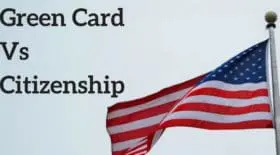If you are living and working in the U.S. as an immigrant, you’ve probably wondered if you’re able to open a bank account. The short answer is yes. As a green card holder, you have the same banking rights as a U.S. citizen, and in most cases, you can open a bank account without an SSN.
Opening A Bank Account as a Green Card Holder
While the requirements from bank to bank may differ, typically, you need a few things to open a bank account:
- An identification number, such as a Taxpayer Identification Number or Social Security Number
- Proof of your physical address, like a utility bill, lease, current driver’s license, or government-issued ID
- Proof of your identity, including name and date of birth (i.e., birth certificate, unexpired passport, consular ID card, government-issued driver’s license)
Banks are required by law to verify the identity of their customers using official sources to prevent financial crime.
Opening a Bank Account Without an SSN
If you’re not eligible to receive a Social Security Number, you can use an Individual Taxpayer Identification Number (ITIN). An ITIN is a nine-digit number issued by the IRS to individuals who need a U.S. taxpayer identification number but do not have and are not eligible to obtain an SSN.
It’s best to use a bank that has a physical branch if you choose this route, because online banks may only have the ability to verify your identity with a Social Security Number.
To confirm that the bank will accept an ITIN number instead of a Social Security Number, it’s best to contact them directly and ask.
As a lawful permanent resident (or green card holder), you are eligible to receive a Social Security Number. Other types of immigrants that are eligible to receive social security numbers are:
- Individuals who have been granted asylum
- Individuals who have gone through the naturalization process and become U.S. citizens
- Certain visa holders who came to the U.S. through employment-based immigration channels.
You can visit a Social Security office to request a Social Security number. If you are a green card holder but don’t have a Social Security Number, you can also use a driver’s license, green card, or unexpired passport as a form of identification to open a bank account. You will typically receive your SSN card in the mail within a few weeks.
Banks that Accept ITIN
- Wells Fargo
- Citibank
- Chase
- Bank of America
- HSBC
Applying for a Taxpayer Identification Number
The Internal Revenue Service assigns Taxpayer ID numbers to foreign nationals living and paying taxes in the United States. You can apply for this number at the same time that you file federal taxes with the IRS. To submit your Taxpayer ID number application, you will need to:
- Complete W-7, Application for Individual Taxpayer Identification Number
- Complete U.S. Individual Income Tax Return
- Submit the completed forms and supporting documentation (passport, etc) using either:
- USPS:
Internal Revenue Service
Austin Service Center ITIN Operation
P.O. Box 149342
Austin, TX 78714-9342 - Private Delivery Service:
ITIN Operation Mail Stop 6090-AUSC
3651 S. Interregional Highway 35
Austin, TX 78741-0000 - Certifying Acceptance Agent (CAA): These are individuals or organizations authorized by the IRS to assist with ITIN applications. A key benefit of using a CAA is that it can verify your original documents and return them to you immediately, avoiding the need to mail them.
- An IRS Taxpayer Assistance Center: These are individuals or organizations authorized by the IRS to assist with ITIN applications.
- Volunteer Income Tax Assistance: Some VITA sites can help prepare your tax return and ITIN application for free.
- USPS:
- Allow 7 weeks to hear back about your ITIN application status.
Important:
For all of these documents, you must submit an original document or a certified copy. A certified copy is a copy of an original document that is certified by the original issuing agency.
Additional forms of proof of identity and foreign status can be seen below. Be aware that an Individual Taxpayer Identification Number is different from an Employer Identification Number (EIN). An EIN is used to identify a business entity.
Here is a list of acceptable documents:
- Passport (stand-alone document)
- National identification card (must show photo, name, current address, date of birth, and expiration date)
- U.S. driver’s license
- Civil birth certificate (required for dependents under 18 years of age)
- Foreign driver’s license
- U.S. state identification card
- Foreign voter’s registration card
- U.S. military identification card
- Foreign military identification card
- Visa
- U.S. Citizenship and Immigration Services (USCIS) photo identification
- Medical records (dependents only – under 6)
- School records (dependents only – under 14, under 18 if a student)
Why Open a Bank Account in the U.S.?
There are many reasons it could benefit you to open a bank account in the United States. Some of the key benefits are:
- Security: When you deposit your money into a bank account, you have peace of mind that it won’t be stolen in a home burglary or lost in a catastrophic event like a fire or flood since the bank insures your funds. It’s also unsafe to keep large sums of money on your person because it makes you a target of attack.
- Financial History: This will help you get credit cards, loans, or mortgages in the future. If you have children, some states also allow you to open a college savings plan (529 plan) that has tax benefits.
- Convenience: Easier to pay bills online, receive direct deposits from your employer, and cash checks.
Can You Open Multiple Bank Accounts as a Green Card Holder?
Yes, you can open multiple bank accounts as a green card holder. There is no limit on the number of checking or savings accounts you can maintain. Some individuals like to take advantage of different perks with different banks and open multiple accounts for that reason. Be prepared for a soft credit check when you open a new account.
Green card holders have the same banking rights as U.S. citizens.
Practical Bank Account Tips for Immigrants
1. Start with the right bank
Consider Wells Fargo, Chase, Bank of America, or Capital One for mainstream banking. These ten are the easiest for newcomers to work with. Also, try a local credit union if there is one that serves your community.
2. Gather your Documents
Bring two government-issued photo IDs (passport, consular ID, or driver’s license), proof of U.S. address, and either an SSN or an ITIN when you visit the bank.
3. Go in Person
Most accounts must be opened face-to-face, and it’s much easier to get help or ask questions if you’re at a branch, rather than being online.
4. Expect a Small Opening Deposit
Many banks will require a deposit of $25-$100 to open the account.
5. Ask about Building Credit
Once your account is open, ask if they offer a credit card.
6. Need a Translator? Ask
Most major banks provide free translation or interpreter services in hundreds of languages – ask if you need one.
Which Banks are the Most Immigrant-Friendly for New Green Card Holders?
Here are some of the top banks frequently recommended by both immigrants and financial advisors:
Bank of America
Bank of America is one of the most immigrant-friendly options, as it accepts foreign passports, ITINs, and green cards, and it also offers multilingual customer support.
Wells Fargo
Wells Fargo makes it relatively simple to open an account in person, and many newcomers report that the branch staff are used to working with recently arrived immigrants.
Chase
Chase is extremely popular with new green card holders because they accept foreign passports and green cards, and they even offer secured credit cards to help you start building a U.S/ credit history right away.
Capital One
Capital One tends to have fewer documentation hurdles and offers simple checking accounts, some of which have no minimum balance, making it a good low-maintenance option for newcomers.
Can DACA Recipients Open a Bank Account?
Yes, if you are the recipient of the Deferred Action for Child Arrivals Program (DACA), then you can open a bank account with a SSN or Taxpayer Identification number along with proof of address and other forms of identification.
Policies vary, so it is best to contact the bank directly to confirm its requirements.
Learn more about DACA recipients. If you’re unaware of your current immigration status and you qualify to open a bank account as an undocumented immigrant, it’s wise to consult an immigration professional.












